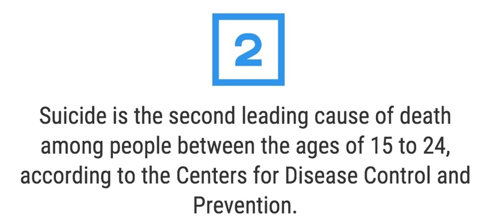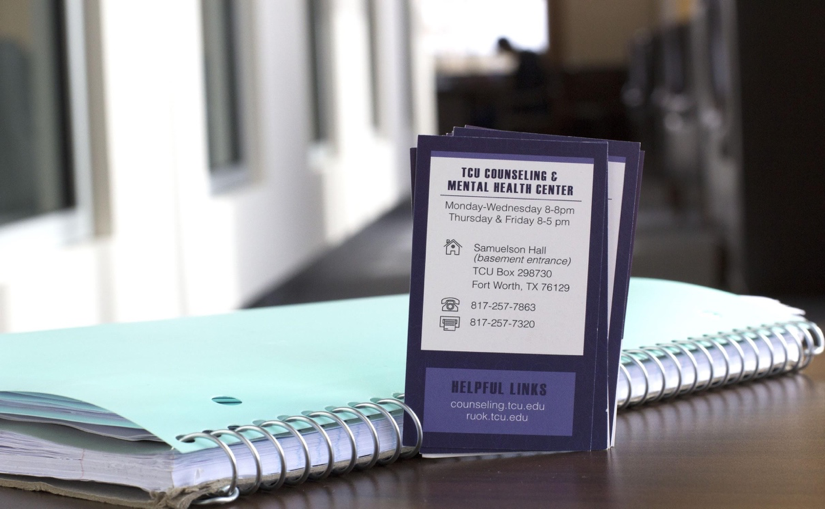In the spring semester of his first year at TCU, a student who chose to remain anonymous purposely stepped into oncoming traffic. The student was drunk and had felt depressed for months. He hadn’t planned to hurt himself, but under the influence of alcohol, that’s what he tried to do. His friends pulled him away from the cars before he could get hurt, but the suicide attempt showed him that he needed to get professional help for the anxiety and depression he had experienced since coming to TCU. “There was definitely an underlying reason I took that step,” he said. “I was so depressed and I felt that I had nowhere to go.” He experienced periods of anxiety during high school, but the issue got worse when he came to college. “Growing up, I had a life that was pretty easy,” he said. “I never really had tough situations where my anxiety and depression [came] out.” This student’s experience is not uncommon on college campuses, where an increased number of students need assistance with their mental health, said Yvonne Giovanis, assistant director of the TCU Wellness Center. A survey found 95 percent of directors of college counseling centers reported a significant increase in severe psychological problems among their students. The TCU Counseling and Mental Health Center sees 10 to 15 percent of the student body each year, said Eric Wood, assistant director of counseling and mental health. Wood added that the increase in the number of students who are reporting mental health concerns, such as anxiety and depression, may actually be caused by an increase in the number of students seeking help- not by an increase in the overall prevalence of these concerns. “I feel like there’s more students who are open to acknowledging that they’re struggling,” Giovanis said. “They’re seeking help.” Although both intermittent sadness and stress are common among college students, when these feelings become pervasive and consuming, students may be facing a mental health concern, Giovanis said. “There are always going to be challenges,” she said. “The key is being able to manage the challenges of daily living. A student who is doing well in mental health is able to cope and figure out how to balance things.” Giovanis added that pressures such as academic demands and the financial burden of paying for college can increase mental health concerns among students. “Knowing the cost of college puts a bit of a burden on students,” she said. “If they or their parents are putting $60,000 a year toward the end goal, this is not something they feel like they can fail at.” The fear of failure contributed to a cycle of anxiety that impacted the academic success of Kristen Pirkey, a senior nursing major. While taking tests, Pirkey said her anxiety would become so severe that she felt as if she “blacked out.” Even when she knew the material she was being tested over, Pirkey’s anxiety prevented her from reading and thinking through the questions. “I really didn’t have any sort of reasoning,” she said. “I knew I was there, but I was not absorbing any of the information that I was reading.” 

 Hill’s ex-boyfriend stopped the suicide attempt and called her parents. Hill spent three days in the hospital and her medication was regulated. She eventually decided to take a year off from school to continue to regain control and spend time with her mom who had been diagnosed with colorectal cancer. Hill said she tried to hide her anxiety and depression from her friends and family because she feared she would be stereotyped and stigmatized. “I wanted people to think I was okay,” she said. “I’m typically a very optimistic person, so being in those situations where I felt worthless was not something I had experienced before I came to college. It was hard to ask for help.” Even though the stigma surrounding mental health has improved over the years, there is still work to be done to educate the people about the true nature of mental health, Giovanis said. “Nowadays, words like depressed, panic attack and anxiety still make people raise their eyebrows,” Hale said. “Many think that people with mental health concerns are ‘crazy’ or that ‘something is wrong with them,’” Hill said. These labels are hard to overcome, said Jasmine Thompson, a senior criminal justice major who dealt with depression throughout high school and college. “Labels make people feel small and make people feel like they are stuck with the condition,” she said. “If you call someone depressed, they may feel they will be depressed forever. If you say someone has depression, they may feel that it’s treatable.” Mental health concerns, such as anxiety and depression, are considered medical conditions that can be treated with the proper medical care, Wood said. “A mental health concern is no different than a heart condition — it’s a health problem,” said Jamie Dulle, an assistant dean of Campus Life. “Just because we can’t see the hidden injury doesn’t mean that it’s not there.” When experiencing mental health concerns there are “actual changes in the brain structure and hormones,” Giovanis said. She added that bipolar disorder and schizophrenia are mental health concerns that are less commonly talked about. “Those are the two where the onset is actually highly likely in this age group if someone is going to start exhibiting symptoms,” Giovanis said. “They tend to be more impactful and a lot of the times, the medication treatments are not as straightforward.” She also said that because bipolar disorder and schizophrenia are less common among students, they are more often stigmatized and misunderstood. Educating people about mental health is an important step in de-stigmatizing the topic, said Thompson. After receiving treatment for his depression and anxiety, the anonymous student wanted to use his experiences to educate and help others who may be facing mental health concerns. He became an orientation leader and shared his story with incoming first-year students. “I wanted them to realize how important it is to focus on your mental health,” he said. “It’s nothing to be ashamed of, so I’m willing to talk about it.”
Hill’s ex-boyfriend stopped the suicide attempt and called her parents. Hill spent three days in the hospital and her medication was regulated. She eventually decided to take a year off from school to continue to regain control and spend time with her mom who had been diagnosed with colorectal cancer. Hill said she tried to hide her anxiety and depression from her friends and family because she feared she would be stereotyped and stigmatized. “I wanted people to think I was okay,” she said. “I’m typically a very optimistic person, so being in those situations where I felt worthless was not something I had experienced before I came to college. It was hard to ask for help.” Even though the stigma surrounding mental health has improved over the years, there is still work to be done to educate the people about the true nature of mental health, Giovanis said. “Nowadays, words like depressed, panic attack and anxiety still make people raise their eyebrows,” Hale said. “Many think that people with mental health concerns are ‘crazy’ or that ‘something is wrong with them,’” Hill said. These labels are hard to overcome, said Jasmine Thompson, a senior criminal justice major who dealt with depression throughout high school and college. “Labels make people feel small and make people feel like they are stuck with the condition,” she said. “If you call someone depressed, they may feel they will be depressed forever. If you say someone has depression, they may feel that it’s treatable.” Mental health concerns, such as anxiety and depression, are considered medical conditions that can be treated with the proper medical care, Wood said. “A mental health concern is no different than a heart condition — it’s a health problem,” said Jamie Dulle, an assistant dean of Campus Life. “Just because we can’t see the hidden injury doesn’t mean that it’s not there.” When experiencing mental health concerns there are “actual changes in the brain structure and hormones,” Giovanis said. She added that bipolar disorder and schizophrenia are mental health concerns that are less commonly talked about. “Those are the two where the onset is actually highly likely in this age group if someone is going to start exhibiting symptoms,” Giovanis said. “They tend to be more impactful and a lot of the times, the medication treatments are not as straightforward.” She also said that because bipolar disorder and schizophrenia are less common among students, they are more often stigmatized and misunderstood. Educating people about mental health is an important step in de-stigmatizing the topic, said Thompson. After receiving treatment for his depression and anxiety, the anonymous student wanted to use his experiences to educate and help others who may be facing mental health concerns. He became an orientation leader and shared his story with incoming first-year students. “I wanted them to realize how important it is to focus on your mental health,” he said. “It’s nothing to be ashamed of, so I’m willing to talk about it.”
Categories:
Rising number of students reporting mental health issues
By Abbey Block
Published Nov 14, 2017
The Counseling and Mental Health Center provide a variety of professional services including counseling, medication management, consultation, and referrals. Services are available to all current TCU students.
More to Discover







